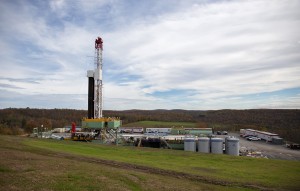Analysis finds Pa.’s effective tax rate on shale gas wells among lowest
-
Marie Cusick

Lindsay Lazarski/WHYY
The state Independent Fiscal Office compared Pennsylvania to ten other shale gas-producing states.
Pennsylvania has one of the lowest effective tax rates on shale gas extraction, according to an analysis from the state’s Independent Fiscal Office (IFO).
The analysis only considers Marcellus gas wells going into production this year. It compares Pennsylvania against ten other shale gas-producing states around the country.
“The states we examined were either a large shale producer, or they were in close proximity to Pennsylvania,” says IFO director Matt Knittel. “Under most of the scenarios we examined, Pennsylvania does have the lowest effective tax rate.”
However, the analysis does leave out some types of taxes paid by natural gas producers, including sales and corporate income taxes.
“Pennsylvania does have the second-highest corporate income tax rate in the United States,” says Knittel. “However it’s difficult because we do not know to whom the income accrues to. It could go to a multi-state corporation. It could be apportioned to Pennsylvania and to another state.”
Knittel says the main taxes the IFO counted were state severance taxes (Pennsylvania’s impact fee was treated as a severance tax) and local property taxes– levied on value of natural gas reserves, yet to be extracted.
The state’s gas industry trade group, the Marcellus Shale Coalition, issued a page-long rebuttal to the report, arguing its methodology was flawed.
“IFO states clearly that Pennsylvania has some of the highest business taxes and energy fees and that this is not an ‘apples to apples’ comparison of the total tax liability for oil and natural gas producers across states,” said MSC president Dave Spigelmyer in a statement.
Governor Corbett’s Energy Executive Patrick Henderson echoed similar sentiments.
“The report fails to account for, among other deficiencies, the full continuum of taxes paid by oil and gas operators in Pennsylvania, including the corporate net or personal income tax; sales and use tax; liquid fuels tax, and others that have contributed over $2 billion to Pennsylvania revenues since 2008.”
In his reelection campaign, Corbett is promoting the state’s existing impact fee–which has generated about $200 million annually–while his democratic opponents have called for a severance tax.
















